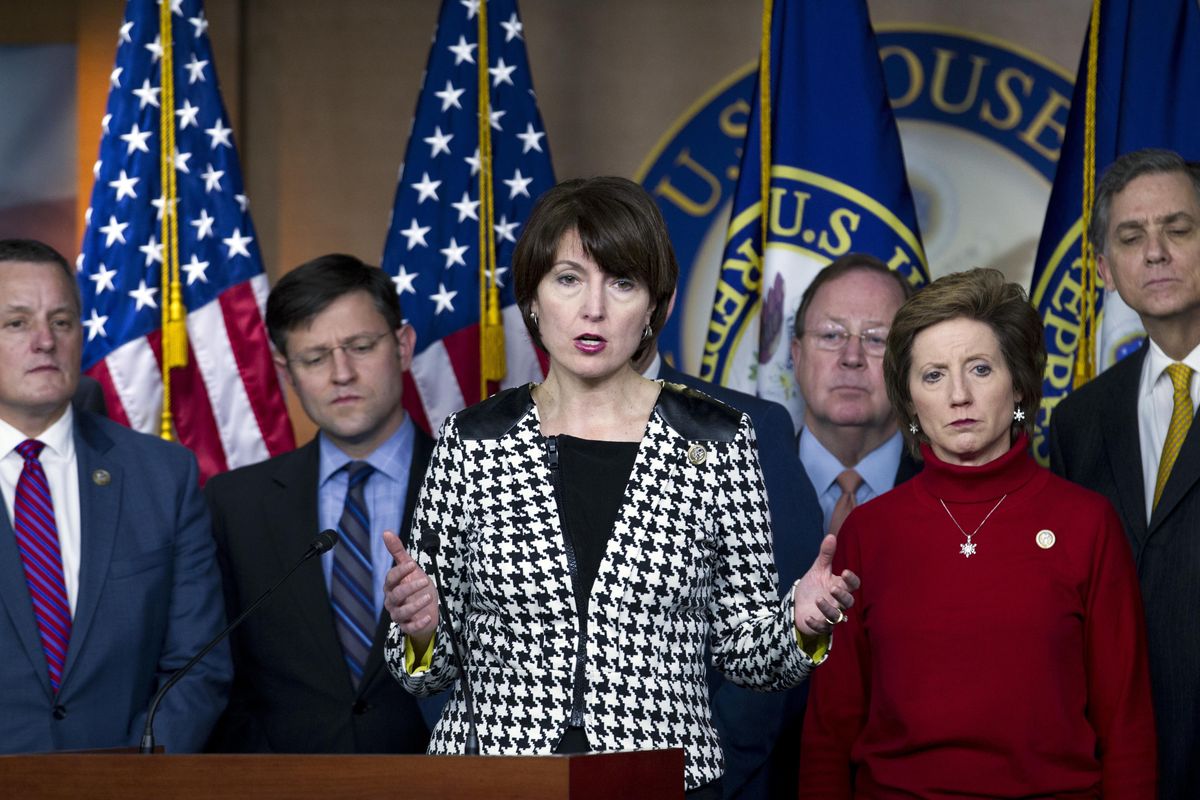McMorris Rodgers: End filibuster in Senate for spending bills

With another government shutdown possible this week, Rep. Cathy McMorris Rodgers says the U.S. Senate should change its longstanding rules that allow the minority party to block spending bills.
“Every year we have to pass a federal budget,” McMorris Rodgers, R-Spokane, said in an interview. “What I am seeing right now, is there’s so much drama in the budget process, we’re not getting to the other issues.”
But Sen. Patty Murray, D-Wash., said such a move likely would be dead on arrival in the upper chamber.
“It’s being floated so that the current party that is in charge can pass very partisan bills that are not fair to people across the country,” Murray said. “I think that would be rejected by Republicans and Democrats in the Senate.”
But McMorris Rodgers isn’t alone in suggesting an end to the filibuster for bills dealing with government spending. President Donald Trump has bemoaned the supermajority needed in the Senate as Democrats dug in their heels on issues including health care and tax reform. Sen. Pat Toomey, R-Pennsylvania, also has suggested Republicans employ what’s called the “nuclear option” to halt filibusters on spending bills.
Senate rules require a three-fifths majority to vote to take up legislation, which ensures that if either party lacks 60 votes they must sway those on the other side of the aisle to move forward.
McMorris Rodgers said the filibuster is being used in ways it never has before and grinding basic government functions to a halt.
“This is not about politics,” said the fourth-ranking Republican in the House of Representatives. “This is about Congress doing its job.”
If the Senate makes the change McMorris Rodgers is recommending, it will be the third time in recent years the filibuster has been defanged. The procedure is seen as a way for those in the minority party to retain a voice in the legislative process, and is one of several institutional features of American government that forces politicians to broker deals, said Cornell Clayton, director of the Thomas S. Foley Institute of Public Policy and Public Service at Washington State University.
“These have all been norms that have sought to empower the minority, in order to force consensus rather than simple majority rule,” Clayton said.
The increasing ideological divide among American voters, coupled with intensely competitive elections, have produced a political climate where parties are trying to do away with those norms, because they stand in the way of legislative action, Clayton said.
“None of this is surprising,” he said.
Both of the parties have had a hand in attacking the filibuster. Democrats first approved the so-called “nuclear option” in 2013, when Republicans, led by Sen. Mitch McConnell, refused to vote on the judicial and departmental nominees forwarded by President Barack Obama.
Four years later and with a new Republican majority behind him, McConnell chose to do the same for U.S. Supreme Court nominees, paving the way for Justice Neil Gorsuch’s confirmation. That was after Republicans took the unprecedented step of blocking a vote on Obama’s nominee, Merrick Garland, for the final nine months of the Democrat’s presidency.
In November 2013, Murray was one of 52 Democratic senators who voted to employ the nuclear option on nominees. She said this week she didn’t see the connection between that action and any present or future Republican efforts to change the rules.
“That was a very limited to just executives and lower court nominees,” Murray said of her 2013 vote. “It doesn’t apply to the Supreme Court. It doesn’t apply to legislation. It certainly doesn’t apply to spending bills.”
McMorris Rodgers said her call for budget reforms has been hastened by the recent shutdown showdowns on Capitol Hill. A 16-day shutdown four years ago was launched over an impasse about implementation of the Affordable Care Act, and the three-day shutdown earlier this year occurred alongside a debate regarding government protections for the children of immigrants who came to the United States illegally.
This amounted to what some have called the “politics of hostage-taking,” Clayton said, in which the minority party holds firm on a budget vote until they’ve received concessions from the party in power. If time runs out, the money stops flowing and government operations cease.
In the past, the fear of being blamed for a shutdown has served to chill filibusters of spending bills. Clayton said it appears that fear still exists, despite two shutdowns within the past five years.
“They know it’s deeply unpopular with the American public,” he said.
In the most recent stoppage, both sides scrambled to point the finger at the other for the weekend shutdown. Republicans insisted it was Sen. Chuck Schumer, the Senate’s minority leader, who was the hostage-taker, while Democrats took aim at the White House for failing to negotiate an immigration plan. The stalemate was broken when McConnell promised to take up the legislative issue and Congress agreed to a short-term spending plan, which expires midnight Thursday.
Trump hinted Tuesday that he’d welcome another shutdown this week if Democrats didn’t back his immigration policy proposals.
Murray said the likeliest defense against the Senate taking up any changes to the filibuster would be the knowledge that fortunes can change for the party in power every two years.
“What goes around, comes around,” she said.